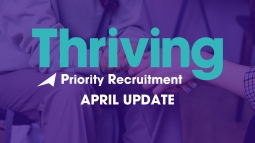Is your employer in administration? Here's what to do next
It is sadly an all too familiar site in retail, sales, or healthcare to see a once beloved and respected brand falling into administration.
It can be a difficult thing to deal with for anyone, which is why we came up with a few quick steps to take if this happens to you. It isn't intended as a legal guide nor does it cover recovering pay, but is designed more as a practical 'do NOW' guide to help you keep moving forward and back into employment.
1. The physical stuff.
Are you still allowed access to your place of work? Collect your belongings! Then capture any information you are rightfully entitled to:
- Payslips (digital systems may stop working)
- Reviews
- Proof of sales vs targets
- Proof of entitlement to commission, overtime or expenses
- Proof of your current role & title if you have recently been promoted
2. Connect with your colleagues.
Times like this are pretty crappy, you will need people to lean on, share with and hopefully; provide mutual support. Your colleagues will be a great support network for you. Reach out in your normal ways - also look to connect professionally on LinkedIn. Typically following an administration once a new employer has taken on one or two staff from the closed business & seen the value in their training etc, they will want to employ more. Connect professionally so you can see what is happening and help each other out.
3. Refresh your CV.
Yep, a painfully obvious one, but critical nonetheless. Need some direction? Have a look at our blog on updating your CV and check out all our Career Advice blogs. If you've already had a go at your CV yourself and want a fresh pair of eyes to look it over, get in touch with one of our team here.
4. Advertise.
Once you are happy with your CV, register here and get it uploaded so all our team can access it. This blog entry is meant to be timeless, so no point guessing which will be the best job board a month or year from now. One solid tip; get your CV on the job board you see advertised a lot on TV/buses/newspapers - you can guarantee recruiters will be looking there too.
Make sure that your LinkedIn profile matches your CV and that you have correctly filled in your work history & company names. For example, don't put "P4U" or "Phones 4U Manchester" as that will be harder for someone like us to find, put in Phones 4.... and wait for the LinkedIn auto-suggest box to pop up... then select the correct company.
5. Know your rights & keep up to date.
It is easy to "cut and run" and want to draw a line under a bad experience, but make sure you keep up to date with developments, complete any paperwork you are sent promptly and do what you need to, thus ensuring you do get any rightfully owed payouts. To find out more about your rights check out https://www.gov.uk/your-rights-if-your-employer-is-insolvent.
6. Don't be a hoarder.
During any intense job hunt & especially when a company falls into administration, you are going to end up speaking to lots of recruiters (both internal & agency) and directly to hiring managers. Not every job they put in front of you is going to be right for you. Make connections, and share details between your colleagues & the people you are speaking with. Don't hoard opportunities. In a recent survey of ex-Phones 4U employees, over 60% said they either got a new role or a genuine opportunity through a personal colleague network referral. Want to get a referral? You have to give them too! Recruitment karma is a thing.
Ok. It's time for the pep talk.
If you've read this far down this is probably an issue that affects you. You probably feel pretty rubbish right about now. Maybe it's the first time you have been out of work. Well, we've got breaking news for you...
YOU DO HAVE A JOB
You have a job. Looking for work should be a full-time job in itself. It's even a great job. The boss is great. There is so much potential. However, the hours are long and the pay is crap.
Opportunities will come and go fast. It is too easy to sit back after firing off a few applications and think you've done all you can do. You need to put the hours in. As a bare minimum, you should put in 50% of the hours you used to work in a typical week. Don't forget you have a competition! If you think you've genuinely run out of things to do in your job search, get in touch with us and we bet we can find you something else to do or try.
The basic steps of a simple job-hunting process:
- Research - Find a job, research the role & the company.
- Apply - Send the best CV you can.
- Connect - Reach out to the business you've applied to, preferably direct to the person responsible for recruiting for that role (regardless of whether an agency or direct employer)
- Follow up - You've heard about the recruiter that whinged about the candidate "going quiet" on them? Well, I bet you've never heard one complain about a keen candidate.
- Expect the phone to ring. It's amazing how many candidates seem surprised when the phone rings, then don't prioritise that call! Either politely re-arrange or drop everything (even if mid-lunch) and engage with the person who has read your CV and WANTS TO TALK to you. This could be THE ONE!
Best of luck. These times won't last forever.





















